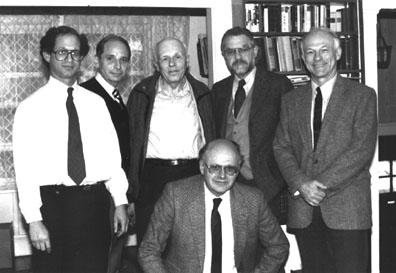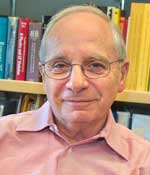At a special session of the American Physical Society in Washington, D.C. on February 15, Morris (Moishe) Pripstein was honored with the society’s Andrei Sakharov Prize recognizing outstanding leadership in upholding human rights. Pripstein shared the prize with Herman Winick of the SLAC National Accelerator Laboratory and Joseph Birman of the City College and City University of New York.
Pripstein, long a member of Berkeley Lab’s Physics Division and still a guest here, is currently a program leader in the National Science Foundation’s Elementary and Particle Physics program.
Over thirty years ago the Iron Curtain, although already starting to rust, was still firmly in place when Pripstein and a Berkeley Lab colleague, the late Denis Keefe, founded an organization called SOS to help dissident Soviet scientists. Initially SOS stood for Scientists for Orlov and Sharansky; before long it had expanded to Scientists for Sakharov, Orlov, and Sharansky.
Yuri Orlov was an accelerator physicist well known to Keefe and then-Lab director Andy Sessler. He and Elena Bonner, wife of Andrei Sakharov—who had led the development of the Soviet H-bomb and invented the tokamak fusion reactor—were founders of the Moscow Helsinki Watch Group monitoring the Helsinki Accords. Intended to reduce Cold War tensions, the accords included a significant statement of human rights. Two years after signing the accords in 1975, the Soviet government sent Orlov to a labor camp in Siberia.
Anatoly Scharansky (Natan Sharansky), a computer scientist, was also a member of the Moscow Helsinki Watch Group, who agitated for the rights of Jews to emigrate. Arrested on charges of treason in 1977, he was convicted in 1978 and sent to Siberia by way of Moscow’s Lefortovo prison. Pripstein invited Sharansky’s wife, Avital, to visit Berkeley Lab and discuss his case.
Sakharov had been an increasingly vocal advocate of nuclear nonproliferation, disarmament, and human rights since the early 1960s and had won the Nobel Peace Prize in 1975. In 1980, having protested the Soviet invasion of Afghanistan, Sakharov, accompanied by Bonner, was internally exiled to the city of Gorky (Nizhny Novgorod), where contact with the outside world was severely limited.

A group of SOS activists gathered in 1988 at the home of Andrei Sakharov's daughter in Newton, Massachusetts. From left, standing, are Robert Cahn and Morris Pripstein of Berkeley Lab, Andrei Sakharov, Philip Siegelman of San Francisco State University, and William Wenzel, also of Berkeley Lab. Kurt Gottfried of Cornell University is in front.
In their initial efforts to help their fellow scientists, Pripstein and Keefe were joined by Berkeley Lab’s Robert Cahn, Michael Chanowitz, Owen Chamberlain, Erwin Friedlander, George Gidal, Gerson Goldhaber, David Jackson, Bill Wenzel, and Sessler, who loaned his office for after-hours meetings, although Pripstein was scrupulous that no SOS work be done on Lab time.
“Although many people helped, [Pripstein] was the primary force in developing the organization,” said Sessler in 1989. “He was the one, almost always, who had the ideas about what to do.”
The most successful of these ideas, and initially the most controversial—contrary to the tradition of scientists as members of an international community—was a voluntary moratorium on scientific exchanges with the Soviet Union. Initially 500 Western scientists agreed; the number climbed to 2,400 after Sharansky’s trial; after Sakharov was sent to Gorky, the moratorium counted 8,000 scientists from 44 countries.
It took time, but in 1986 the moratorium saw results. Orlov was deported to the U.S. and is now a professor at Cornell University. Sharansky was deported to Germany and moved to Israel, where he has been active in government. Sakharov was permitted to return to Moscow and became a member of parliament; he died in 1989. Elena Bonner still lives in Moscow.
Go here for the text of Moishe Pripstein’s remarks upon the award of the Sakharov Prize.
Additional information
More about the American Physical Society’s Andrei Sakharov Prize
More about Moishe Pripstein
This article draws on “Lab Scientist Wins Human Rights Award For Effort to Help Soviet Dissidents,” by Monica Friedlander, in the Fall 1988 issue of Berkeley Lab’s Research Review.
